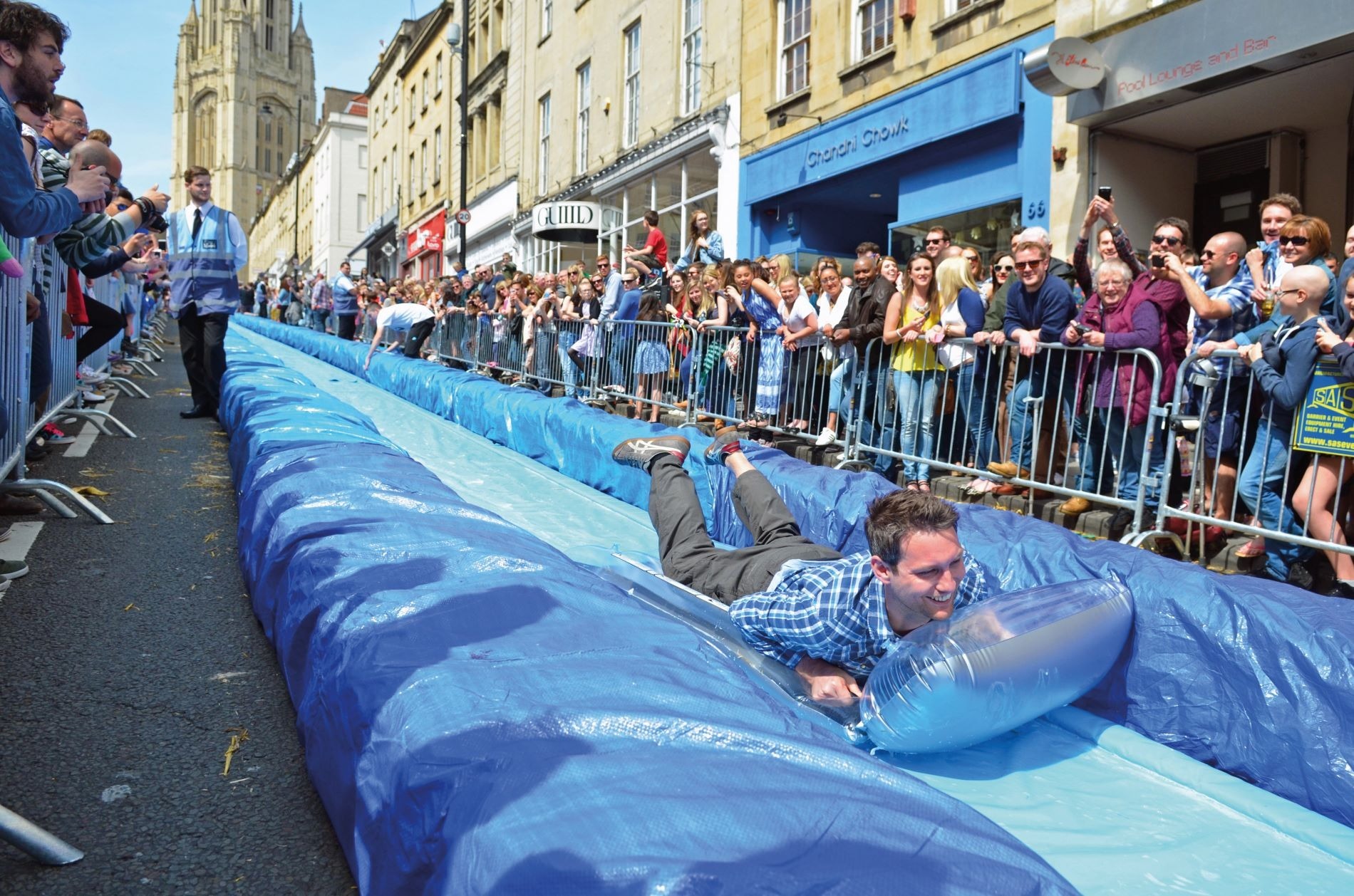Nostalgia serves a psychological purpose

It’s late summer and the afternoon sun is beating off Shoreditch’s sheer glass facades and gum-littered pavements. My colleagues and I are en route to a “secret location” for our end-of-summer party, anticipating a space to socialise and soak up the last of the year’s warmth. We arrive, and a set of metal doors off the high street quickly dash these hopes. Natural light and the white noise of London’s traffic give way to pulsating music and darkness punctuated by bright colours. Dazed, we wander into the venue and are greeted by a stern-looking bouncer with a thick neck, his arms crossed. He’s guarding the entrance to a ball pit populated by a group of clamorous 20-somethings.
This cocktail bar is one of several similar locations that have opened across the UK in recent years. Technicolor ball pits and retro arcade games are interspersed among bars offering “nostalgic” mixed drinks and over-priced beer. In this particular establishment, a wall flanking one of the pits is adorned with at least a dozen pairs of clumsily crafted papier-mâché breasts. This collision of a seedy adult venue and nostalgic childhood playpens is unsettling. So, what’s the allure of such spaces?
“Kidulting” is a cultural trend that sees adults engage in pastimes traditionally considered more appropriate for children. This can include playing with toys, collecting figurines or cards, dressing up and cosplaying – anything that feels like a reversion to feel-good childhood behaviours. And while this new term hit mainstream popular culture during the 2020s, it’s by no means a new phenomenon. The portmanteau “rejuvenile” was used by American writer Christopher Noxon in his 2006 book of the same name, while Dan Kiley coined the pop-psychology term “Peter Pan syndrome”. Both were describing adults who seemingly struggle to grow up.
Millennials – currently people aged 28 to 43 – have long been tarred with this brush, along with accusations of laziness and narcissism. Now, their Gen Z counterparts are getting the same treatment, with words like “entitled” and “infantile” being hurled at today’s teens and 20-somethings. Comment pieces write them off as over-indulged offspring who are uniquely averse to a hard day’s work.
Proliferating catastrophes during the 21st century have indeed stifled the aspirations and ambitions of many young adults in the UK. The financial crisis of 2007–8 hit many millennials as they moved into the job market and pandemic restrictions kept Gen Zers at home during their formative teenage years. Meanwhile, a housing shortage has inflated property and rental prices to record highs, just as soaring living costs have driven down real wages.
The collective experience of these crises has had a stark impact on conventional life milestones. For example, the number of adult children in the UK living with their parents has risen 14.7 per cent since 2011 to around 4.9 million people. Many are also delaying starting a family or calling it off altogether. As these conventional markers of “adulthood” accelerate out of reach, many seem to have been left in a suspended state of adolescence.
Within this context, the kidulting trend has been frowned upon as further evidence that younger generations are immature and turning their backs on the realities of life. Take the hot-pink cultural phenomenon that was the Barbie movie. With far-reaching implications beyond cinema screens, its use of the doll’s iconic IP was a masterclass in nostalgic marketing, incorporating classic elements of the 60-year-old brand to transport fans back to their childhoods. The playful production was such a hit that Barbie-maker Mattel has since announced a Barney the Dinosaur film “for adults”.
Then there’s the rise of the “Disney Adults” with their devotion to The Walt Disney Company enacted through cosplay, merchandise purchases and multiple theme park visits. They’re often mocked and derided as the most-hated group on the internet and even as a signal of the “end of Western civilisation,” as Jodi Eichler-Levine, a professor of religious studies at Lehigh University, observed in Rolling Stone.
The adoption of childhood aesthetics has likewise emerged in fashion via so-called “kidcore” pieces. Garments adorned with garish childlike patterns and sparkling noughties-style hair clips have cropped up on high-fashion runways and are creeping into popular consciousness via social media. McDonald’s has even heralded the return of its “Adult Happy Meals”, featuring retro collectable toys reminiscent of the 80s. Similarly, the events platform Eventbrite has seen a 53 per cent increase in attendance of “nostalgia” activities in the UK post-pandemic– such as retro gaming, laser tag and discos.
It may seem more natural for younger generations to spend time thinking about the future – excited to make family plans or advance their careers. However, according to 2023 research from Global Web Index, 15 per cent of Gen Zers and 14 per cent of millennials globally prefer to think about the past rather than the future. Around half also say they feel nostalgic for certain types of media – with movies, music and TV shows from the 90s and 00s providing the most potent triggers.
But does the kidulting trend necessarily indicate the growth of the dreaded “Peter Pan syndrome” and a refusal to grow up? Or is it a more complex behavioural reaction to the stress and pressures faced by today’s youth?
As a psychologist and leading expert on nostalgia, Dr Clay Routledge recognises nostalgic thoughts and behaviour as effective coping mechanisms. “When people experience stress, anxiety, sadness, loneliness or other unpleasant mental states, nostalgic reflection helps them see a bigger picture,” he says. His work as vice president of research at the Archbridge Institute’s Human Flourishing Lab in Washington, DC has uncovered the profound impact of looking to the past on people’s mental states.
“In a survey my colleagues and I recently conducted, we found that most American adults in every age cohort view their nostalgic memories as a source of comfort, inspiration and guidance. Many of the behaviours that appear to be superficial consumer purchases may actually reflect an effort to cultivate a nostalgic environment that helps people connect with their past in constructive ways. Yes, some of it is just entertainment. But I also think it is something deeper.”
There’s also some evidence that nostalgic activities can better connect people to themselves and those around them – contributing to resilience, optimism and creativity and helping to cultivate personal progress. Speaking to me from a room crowded with musical instruments, LEGO sets and 80s toys, Dr Richard Courtney is animated and reflective about his childhood and the cultural artefacts scattered around his home.
“You can see there’s Optimus Prime. Upstairs in the loft, I’ve got all the original Transformers,” he says as he pans his phone camera around the cluttered room. “We’ve also got a lot of lightsabers in this house. And if you look down there, there are some brand-new Star Wars figures, but packaged like they came out in 1981 – it just takes you back to that place.”
The 47-year-old is head of business entrepreneurship and finance at the University of East London. He acknowledges that financial stress during his formative years meant a conventional path to adulthood was out of reach, leading him to become a self-confessed kidult. “As we grew up through the 80s and 90s, the economic times changed. It put some people like myself in a constant state of being a child where we never really grew up,” he says.
But fast-forward two decades and Courtney had his own child. Now, the passion for the figurines and playthings he has carried into adult life also brings him closer to his son. “I’ve got a nine-year-old boy who we would describe as neuro-diverse,” he says. “He’s very methodical about things and very creative – so it’s always been a really good thing to bring him up in a way that also connects with my own childhood.” Courtney says the toys he has held onto and his desire to mine the past for youthful comforts have helped him become a better father. “They’ve become a really good way to be a parent on a horizontal level. Rather than talking down to [my son], we can sit together and be on the same level.”
Courtney’s bonding with his son is just one of many examples that demonstrate how relishing in nostalgic memories can bring personal benefits and bolster relationships with those around us. More broadly, this can be achieved by participating in play as an adult through anything from board games to collectable figurines or even rewatching a childhood classic movie with a friend. In revisiting these fond memories and engaging with a part of ourselves that is so often suppressed in our adult years, such behaviours can provide a sense of rejuvenation on returning to the travails of modern life.
“It is easy to be critical of the idea of kidulting, to view it as reflecting immaturity or a form of unhealthy escapism,” says Routledge. “But I am increasingly seeing positive aspects of it. And I don’t think it is as new as people think. Humans have probably always looked for ways to seek comfort and re-energise a youthful spirit. We just create new ways of doing it. People don’t realise how creative and innovative nostalgia is as a cultural force.”
Back in Shoreditch, my colleagues and I are led to a corner of the darkened venue, our glass tables filled with drinks that have taken on a luminescent quality thanks to the day-glo fittings. Knocking back the dregs of my “Caprisunha” cocktail, I stride with purpose alongside a colleague towards the youthful revelry on display in the ball pit. The bouncer gives us a knowing nod, and we scramble up the ramp into the arena, channelling our inner children. As we lower ourselves into the sea of glowing orbs to join our fellow kidults, the stress of the workday dissipates, and everything starts to feel okay.
This article is from New Humanist’s autumn 2024 issue. Subscribe now.

